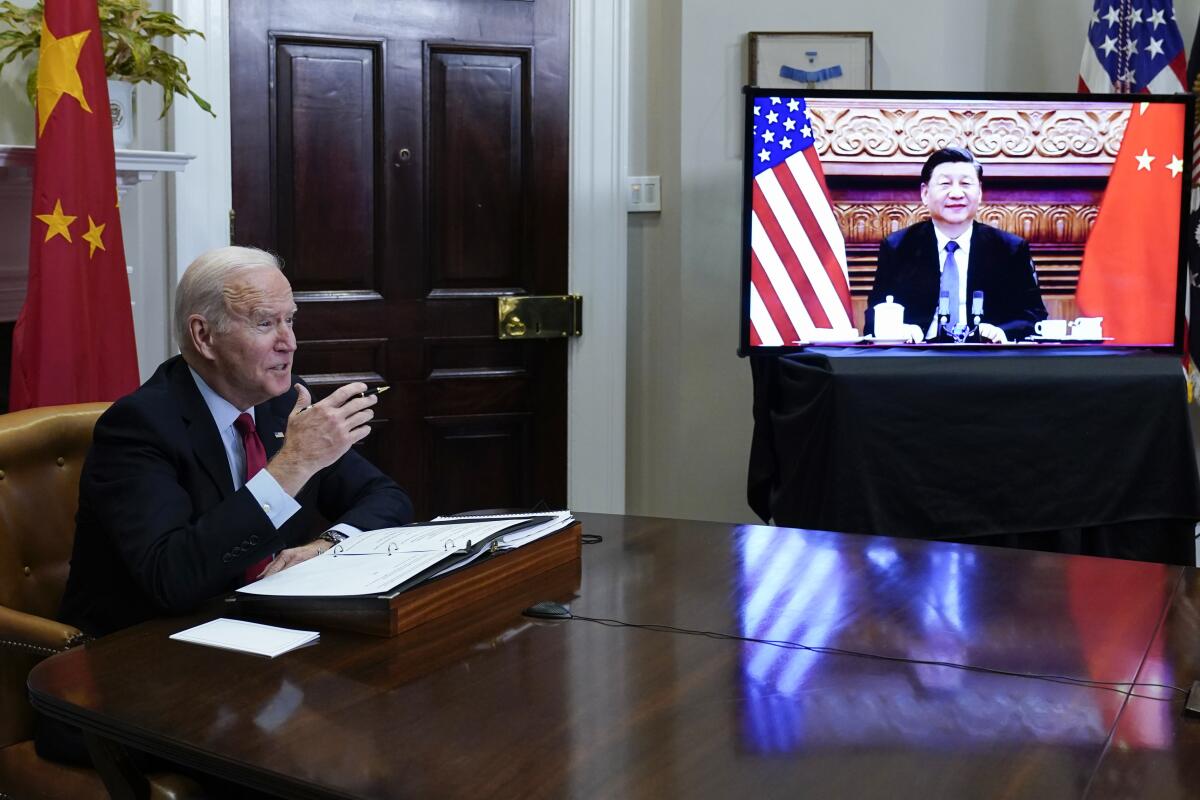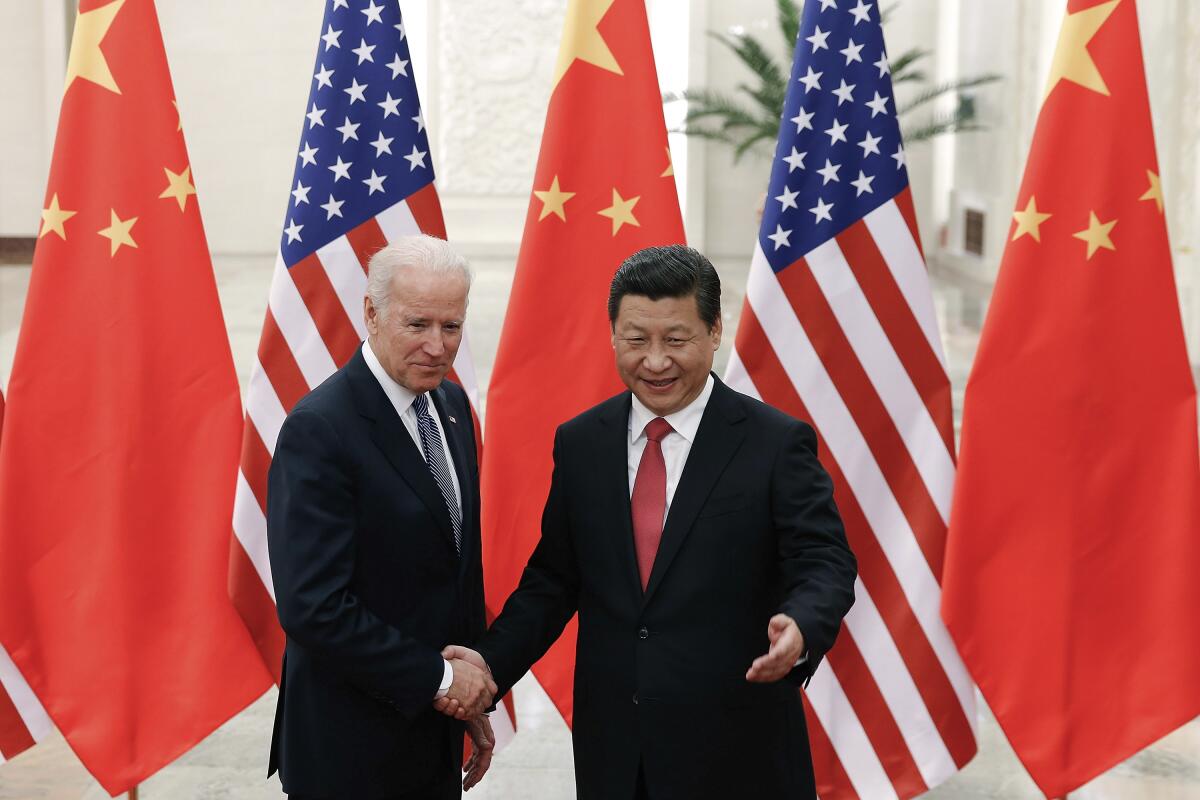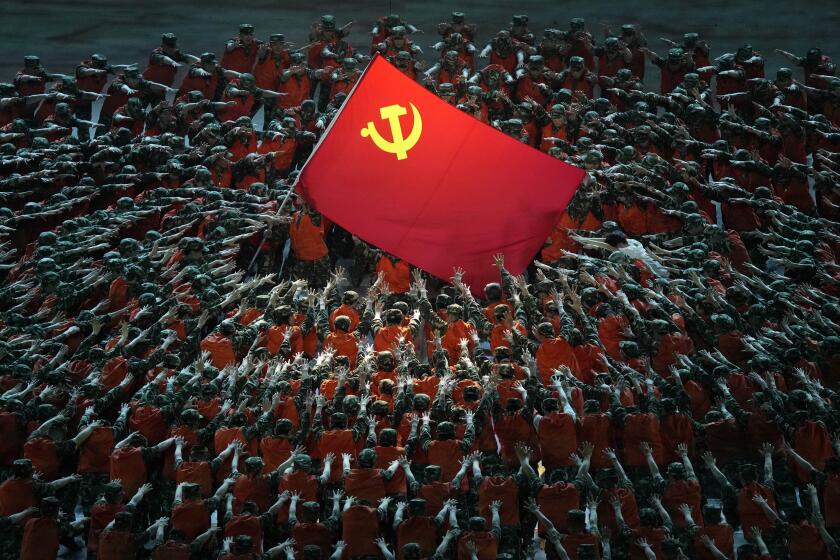Biden and Xi, once travel companions, face off in virtual meeting

WASHINGTON — Nearly a decade ago, Joe Biden hosted Xi Jinping for a tour of America that ended in Los Angeles, where they visited a school dedicated to teaching Asian languages. As they mingled casually with students, the two vice presidents couldn’t avoid the geopolitics hanging over what was supposed to be a lighthearted affair.
U.S. relations with China would determine the course of the century, Biden said, calling it “the single most important engagement we have.”
Now, Biden and Xi are presidents of their respective countries, and are responsible for navigating a relationship that has slipped from wary optimism into bitter pessimism. There are no more goodwill trips, no more hopeful statements about fostering mutual understanding.
As the two leaders began their face-to-face meeting via videoconference on Monday, there were only a few flickers of warmth from their years of visiting each other’s homelands.
Biden acknowledged that they had “spent an awful lot of time talking to each other” and “have never been that formal” when together. Xi said he was “very happy to see my old friend.”
Mostly, however, there was the cold language of global strategy as the two superpowers have become entrenched in what some analysts have described as a second Cold War. It’s a tense dynamic that has generated warnings about the potential for armed conflict, most notably over Taiwan, an island democracy that China considers a breakaway province and has vowed to reclaim.
“We need to establish a commonsense guardrail,” Biden said, adding that he intended to address Xi “very honestly and candidly.”
For his part, Xi said that “China and the U.S. need to increase communication and cooperation.”
A century into the Chinese Communist Party’s rule, we traveled across China to explore parts of its told and untold history.
The meeting lasted for more than three hours, with a brief break midway through. A senior administration official, who was granted anonymity to discuss the private conversation, said it was “respectful and straightforward” and included “healthy debate.”
Chinese state media quoted Xi as using a nautical metaphor to describe the dialogue between the two countries.
“We must stabilize the rudder so the two giant ships of China and the United States will move forward against the wind and waves together, without losing the way, slowing down or colliding,” Xi said.
Xi has not left China since the start of the COVID-19 pandemic, skipping recent summits of world leaders in Italy and Scotland. He and Biden had previously spoken twice on the phone since Biden’s inauguration in January, and during Monday’s virtual meeting the two men waved to each other as their images appeared on their screens.
Biden spoke to Xi from the Roosevelt Room of the White House, where he was joined by top officials including Secretary of State Antony J. Blinken and Treasury Secretary Janet Yellen. Xi had his own array of advisors with him, as well.
As expected, the meeting did not end with a joint statement or any announcements, and Taiwan appeared to remain an explosive issue between the two countries.
Chinese state media emphasized reports that Biden did not express support for Taiwan’s independence, and it said that Xi accused Taiwanese leaders of trying to “lean on the U.S. to get independence.”
“This is a very dangerous trend. It is playing with fire, and one who plays with fire must self-immolate,” Xi was quoted as saying in the meeting. Xi reportedly said that he did not want conflict with the U.S. but would take “decisive measures” if Taiwan provoked China.
The White House said Biden “opposes unilateral efforts to change the status quo or undermine peace and stability across the Taiwan Strait.”
The senior administration official said there was “nothing new established” as far as agreements to prevent conflict over the island.
“Both have an incentive to demonstrate resolve, to look strong. But you want to look strong without things getting out of control,” said Ja-Ian Chong, an associate professor of political science at the National University of Singapore. “It’s a matter of how are they going to thread this needle?”
Chong said he believes that the risk of conflict remains low, “but that depends on everybody playing by the script.” However, that can be difficult when there are nervous or excitable service members at the controls of planes and ships that circle each other in the South China Sea, which Washington considers international waters and Beijing claims as part of its territory.
“In some ways, it’s a bit of a game of chicken,” he said.

Dean Cheng, a senior research fellow at the Heritage Foundation, said China hasn’t always cooperated with efforts to deescalate tensions in the region, saying “the Chinese don’t pick up the hotlines” that are typically reserved for crisis communications between superpowers.
He was skeptical that the meeting will prove to be productive because China routinely rejects American concerns about oppression of Uyghurs, a Muslim ethnic group in the Xinjiang region, or its tightening grip on Hong Kong, where Beijing has used a new national security law to stomp out dissent.
“Realistically, we’re going to end up in all likelihood talking past each other,” Cheng said.
Jake Sullivan, Biden’s national security advisor, said last week that Washington and Beijing are not fated to conflict.
“China has a different value system. It has different interests. And that’s part of what the ongoing competition will be about,” he told the Lowy Institute, a think tank based in Sydney, Australia. “But there’s no reason that that competition has to turn into conflict or confrontation.”
There was a thaw in the relationship during the recent United Nations summit on climate change in Glasgow, Scotland, where the U.S. and China announced a surprise agreement over the weekend to increase their efforts to reduce greenhouse gas emissions. Details were scarce, but it was a sign that some lines of communication remain open and potentially productive.
Another potentially positive sign came around the same time as Biden and Xi’s meeting, when a branch of the Chinese Foreign Ministry held an event commemorating the 80th anniversary of the Flying Tigers, a group of American volunteer pilots who fought Japanese forces in China during World War II.
China’s ambassador to the U.S., Qin Gang, said during the virtual event that the two countries’ relationship was facing a “serious test” but should still seek cooperation. The nations “should carry forward the friendship forged in battle by our people, rather than falling into misunderstanding, miscalculation, or even conflict and confrontation.”
The affectionate tone contrasted with the combative, even hostile way that Chinese Foreign Ministry officials have spoken of the U.S. in recent years.
Biden and Xi entered Monday’s meeting at a time when they’re trying to strengthen their political standing at home.
Hours before he sat down to speak with Xi, Biden signed legislation with more than $1 trillion of spending on roads, bridges, water pipes, broadband access and other infrastructure, an investment that he has described as a way to keep pace with China’s aggressive program of public works projects.
He’s still pushing for a $1.85-trillion piece of legislation to create universal access to free preschool, expand public healthcare coverage and boost clean energy to fight climate change.

Meanwhile, Xi is consolidating power in China as he seeks an unprecedented third term as president. The Communist Party’s Central Committee passed a resolution last week declaring Xi’s position “as the core of the entire party” and saying his role reflects “the common wishes of the entire party, military, state and peoples of all ethnicities.”
Only two previous Chinese leaders, Mao Zedong and Deng Xiaoping, had similar statements issued while they were in power.
Xi and Biden have known each other for years, although the intimacy does not seem to have generated harmony.
In addition to the time that Biden hosted Xi in 2012, Biden visited China in 2011 and 2013. Xi had become president by the time of the second trip, and Biden said “the possibilities are limitless” if the two countries forged a good relationship.
But Biden has been much harsher recently, describing Xi as a “thug” and saying he doesn’t have a “democratic bone in his body.”
His hardening sentiment reflects a broader shift in the American foreign policy establishment. Despite concerns about President Trump’s chaotic and aggressive approach to China, a bipartisan consensus has emerged that more needs to be done to counter Beijing’s growing influence.
Daniel Russel, a former State Department official who works at the Asia Society Policy Institute, said Biden has always believed “that America, as a free society, had huge advantages over China, ones that China could not overcome.”
“I don’t think his faith in the U.S. is shaken at all,” he said. “But I do believe that he feels we’re faced with a much more formidable competitor than in the past, and we damn well better get our act together.”
Times staff writer Alice Su in Beijing contributed to this report.
More to Read
Get the L.A. Times Politics newsletter
Deeply reported insights into legislation, politics and policy from Sacramento, Washington and beyond. In your inbox three times per week.
You may occasionally receive promotional content from the Los Angeles Times.












